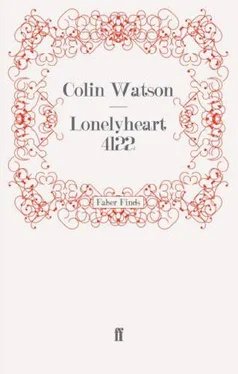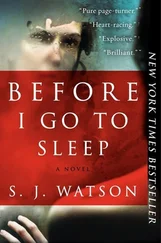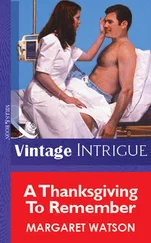“Anything missing?”
“They’ve been in there again.” Mrs Staunch indicated the filing cabinet.
Purbright took out his handkerchief and eased forward the top drawer. Its contents did seem less tidy than when he had glanced at them on his previous visit.
The significance of the handkerchief was not lost on Mrs Staunch. “I’m afraid I can’t say that I haven’t touched anything, inspector. I didn’t notice the window straight away.”
“No, I shouldn’t have expected you to. It would be as well, though, if we observe the Agatha Christie rules from now on. I’ll get someone over.” He reached for the telephone. “May I?”
In less than ten minutes there arrived Detective Constable Harper, bearing a leather case and a camera the size of a hurdy-gurdy.
The outing was clearly a treat for him. He loped around the little room like an exploring Gibbon and happily spooned great quantities of grey powder on all accessible surfaces, including several that took account of the possibility of the intruder’s having been eight feet tall.
“He won’t hurt anything, you know,” Purbright said to Mrs Staunch in a murmured aside. She did not appear convinced.
“No—those are very private,” she called. Harper had been in the act of lifting some of the folders out of the filing cabinet. He looked inquiringly at Purbright.
“Just the covers, Mr Harper...no, on second thoughts, you’d better leave them alone altogether. If he wore gloves, you’ll be wasting your time, and if he didn’t, there’ll be better prints on what you’ve got already.”
Mrs Staunch gave him a small smile of gratitude. From that point, Harper’s inspiration rapidly evaporated and soon he was dismantling his props and packing lenses and bottles and plates and brushes back in their compartments of the leather case.
“It’s quite a business, isn’t it?” observed Mrs Staunch, rather nervily. The worst part of the ordeal, although she did not say so, had been Harper’s habit of continuously whistling one tune—the March of the Toreadors—through closed teeth while he worked.
Almost immediately after his departure, a buzzer sounded. Mrs Staunch glanced up at an indicator on the wall. One of its pair of electric bulbs flickered for several seconds.
“I’m afraid a client has just come in,” she explained. “Would you mind if I left you now, inspector?”
“Not in the least,” Purbright assured her. “I shall be busy myself for a little while.” He patted the cabinet in explanation. Mrs Staunch hesitated, frowning. Then she shrugged and opened the door. “You will remember what I said, won’t you? About confidences? I mean, they’re the whole essence...” She left the sentence unfinished, but there was a plea in her eyes.
“Of course, Mrs Staunch. I really do understand.”
The door closed.
Purbright soon found that what the proprietress would have called her “ladies’ section” was less crowded than the reference numbers—three hundred and upwards—suggested. The system was doubtless based on the same psychological principle as that employed by newspapers to make the volume of box advertising seem bigger than it really was.
The number of recent registrations—and only in these was he interested—was about a dozen. He removed them from the file and read them through carefully.
Nearly all told the same story, though it had to be reached through a terminology of cheerful cliché which had been obviously adopted at Mrs Staunch’s dictation. It was an ordinary, if saddening, tale of women whose lack of youth, money and social graces threatened a lonely and comfortless future. Purbright suspected that most of the applicants could have ill afforded the twenty guinea fee. Three, he noticed, were old age pensioners; two others, the widows of farm labourers. A sixth, who hopefully offered “careful housekeeping and good cooking in home of Suitable gentleman”, was a school canteen helper. Under “Means (for office use only)”, one woman had written: “Maintenance money, four pounds per week“.
Not exactly a rich field, Purbright reflected, for criminal exploitation.
There were two forms, however, whose promises were distinctly above average.
The first of these had been filled in by a woman called Rose Prentice, age 58, divorcée. Her occupation was described as stock breeding and farm management; her hobbies, not unexpectedly, as riding, shooting and dog showing. She had written in the Personal Appearance section simply “Good seat” and through “Means” had dashed a short, heavy line. Purbright did not doubt that this was an intimation of land ownership and the firm resolve to hang on to it.
The qualities for which Mrs Prentice looked in a mate were expressed with equal bluntness. He would have to be strong, energetic, used to stud work and willing to muck out. A tolerance of children would not come amiss: the farm was always being visited by one batch or another of the many grand-children in the family.
Purbright made the experiment of thinking of himself as a confidence man and of Mrs Prentice as his victim. Rose, I love you, how about making the farm deeds over to me. I’m awfully good at managing things— Have you done the mucking out yet? —Not yet, could I have five hundred pounds for that tractor I told you about which is such a bargain?— We’ve a tractor already, if you’re really hard up there’s three and six egg money in the cash box in the bread pippin —Please let me handle your insurance, dear Rose, and I will devour you with kisses— Here’s my card and this week’s stamp; now then, are you used to stud work? —What with twenty-seven kids hanging about? You’re jo...
Purbright started, as if from a dream that had begun to lead him down sinister by-ways. He shut the folder and added it to the rejects.
One candidate remained. A second perusal of her form left the inspector in no doubt of his having discovered an almost perfect bait. He quickly copied the details into his notebook, then put all the folders away in their proper order in the drawer.
Before finally closing it, he made a rapid scrutiny of the record of Mrs Staunch’s male clients, but found none that seemed any more worthy of close investigation than the five on whom time had been wasted already.
Quietly he let himself out of the back door.
Sergeant Love greeted the name of Purbright’s find with sceptical amusement.
“Lucilla Edith Cavell Teatime...oh, cripes! No wonder she wants to change it.”
“At least it’s memorable. That should help you a bit, Sid.”
“Me?”
“Yes. You are hereby assigned to her. If she were a mere Miss Smith or Miss Jones, you might forget whom you were supposed to be following, or at least grow lax in observation. But let me tell you about Miss Teatime.
“She admits to being forty-three years old, but her middle names suggest birth during the first world war, so fifty is probably nearer the mark. What she looks like you will have to find out for yourself. She is staying at the Roebuck, so Jim Maddox might be helpful to you. Or there’s that tottie who used to fancy you—the one in the tap...”
“Phylh’s Blow?” Love looked alarmed.
“Oh, I don’t know her name,” Purbright said in a way that implied fornication to be a triviality with which those above the rank of sergeant were not concerned. “Anyway, how you get in tow in the first place is up to you; what I want is a report of where the Teatime goes and—more important whom she meets. Do you think you can do that?”
“I don’t see why not,” said Love. “She can’t trot round much if she’s all that old.”
“What do you mean—all that old?”
“You said you thought she was fifty.”
Читать дальше












